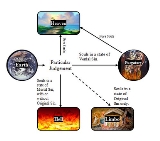francisthekkekkara
When a soul departs the body of a person on his/her death, it is subject to a judgment - called Particular Judgment - either for eternal life or for eternal punishment or for purification in the purgatory; the Final Judgment which takes place at the end of time only confirms/reiterates what is pronounced in the Particular Judgment. This is what the eschatology of the Catholic Church says. A close perusal of the Word of God, however, points to a different path altogether.
Why should we pray at all for the dead if Particular Judgment subsumes the Final Judgment as well? Final Judgment is irrevocable! Suppose a person has been condemned to ten years of sanctification. If the penitential prayers of the living have caused to reduce its duration to five years, how could one claim that earlier condemnation was final? Does the Word of God say (anywhere) that the Particular Judgment contains the Final? However, the Final Judgment takes place only at the end of Time.
Why should we pray at all for the dead if Particular Judgment subsumes the Final Judgment as well? Final Judgment is irrevocable! Suppose a person has been condemned to ten years of sanctification. If the penitential prayers of the living have caused to reduce its duration to five years, how could one claim that earlier condemnation was final? Does the Word of God say (anywhere) that the Particular Judgment contains the Final? However, the Final Judgment takes place only at the end of Time.


